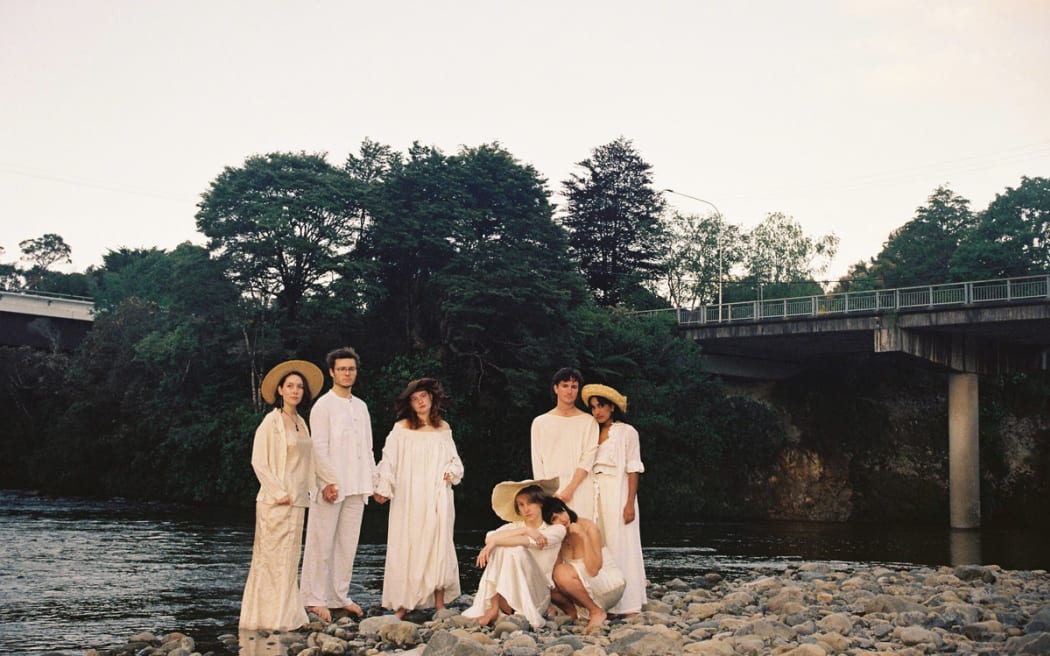Tony Stamp checks out the debut LP by Poneke's Recitals, a frosty collection from Ōtautahi violinist Motte, and more funny, catchy indie rock courtesy of Canadians Kiwi Jr.
Orbit I by Recitals

Photo: Supplied
Being in this Poneke band seems like fun. Their photoshoots feature a lot of physical proximity, and one series (seen above), has them all in matching white, adding a vaguely cultish vibe to proceedings.
Their bio stresses the members’ diverse musical backgrounds, and this debut album is certainly diverse - often within one song, or even one verse.
But their camaraderie is evident: in those photos, and this complex, multifaceted music. It’s the sound of people enjoying themselves.
They're a seven-piece, including a trumpet player and cellist, and at first, I reached for comparisons with other robustly-filled outfits like Arcade Fire and Polyphonic Spree.
Black Country New Road might be a closer match in terms of angst, but one of the things that distinguishes Recitals is their restless songcraft and generosity toward each member. It all feels very egalitarian.
‘Tongue’ mixes Xanthe Rook’s hushed vocal with rhythmic bombast, and makes it all feel natural. The next track ‘Gradient’ follows a similar trajectory but finds more room for them to, for lack of a better word, rock.
There’s a certain energy a band generates when they’re all performing at once, and firing on all cylinders, and these songs have it in spades. Again, it’s like you can hear the camaraderie.
The liner notes list which studios were used, but also mention bedrooms and houses, and go on to say what the members were thinking about: things like interconnectivity, feminist theology, and erotic fantasy.
That last one is something musicians often shy away from (outside of pop music). Here it’s admirably made an asset: ‘Tongue’ in particular lingers on imagery of honey and, well, tongues, and late in the album the song ‘Sweat’ veers into something like industrial glam rock: swaggering, and pretty sexy.
Elsewhere the band indulge in long instrumental passages that make the most of all the textures they’re able to generate, and on ‘Angelpoise’ wind up somewhere close to ambient music, ethereal and suspended between notes.
It goes without saying that they’re all great players, but I do want to single out drummer Josh Finegan - purely because it took me a while to appreciate how much he’s doing in each song. I’s there if you want to hear it, but his playing never overpowers the tunes.
Orbit I is arriving on Flying Nun Records, not a bad label for a debut album. Recitals are worth getting excited about, a group of people who seem to like each other a lot, and show that affection through their creative synergy.
They achieve a delicate balance - hyperactive but relaxed; virtuosic but restrained, often all at once.
Cold + Liquid by Motte

Photo: Supplied
Listening to this album I quickly formed opinions on how it evokes temperature in its chilly compositions.
Then I saw its artwork: images of stalagmites (or possibly stalactites) forming, and read Motte's thoroughly considered description of making it, and realised none of this was coincidence: she set out to make an album that, according to her PR, “builds glacial atmosphere and frozen moods”.
Anita Clarke is listed on the album as a "master violinist". She’s currently playing with The Phoenix Foundation and Don McGlashan and has credits on film scores and dance compositions.
Even without Cold + Liquid's thematic packaging, I’d be reaching for adjectives like ‘chilly’ and ‘icy’ when describing her playing, as well as her singing voice.
Maybe that’s why she came up with the idea. Regardless, it’s a perfect conceptual vehicle for her crystalline tones.
Her palette expanded on this second album to include guitar and synth, some of it supplied by Ben Woods, the album’s only guest.
It’s all intentionally sparse and echoing, and Clark went as far as to include on-theme field recordings gathered in the environmental site Sign of the Bellbird in Christchurch, as well as sounds supplied to her by friends: the temperature control room in Oamaru freezing works, and mechanical drones under the deck of a ship docked in Lyttleton Harbour.
The innovative violin playing on Cold & Liquid is expressive enough to anchor a whole album, and originally that was the idea: Clarke was suffering from vocal cord paralysis. As the time to record approached, her voice returned, so she spent a week rewriting the album to include singing.
It’s designed as an immersive experience and does sometimes feel like the aural equivalent of caving, as Motte’s strings swoop and trill around you.
Often this kind of music aims for warmth and comfort - it’s nice to hear something so purposefully chilly.
Chopper by Kiwi Jr

Photo: Supplied
Recently Kiwi Jr posted on Twitter using a popular meme format that’s doing the rounds. They addressed the fact that they’re from Canada, not New Zealand, and they don’t actually sound that much like the band Pavement.
That comparison comes up a lot, in fact when I interviewed them last year the mention prompted a moment of defeated silence.
The band has stressed a new wave influence on their third album Chopper, and you can definitely feel them trying to distance themselves from the iconic nineties band.
It must be said though, the comparison is still quite uncanny at times, despite their best efforts. It’s also true that they write fantastic, concise songs, full of hooks and amusing details.
In our interview, the band told me the ‘kiwi’ in their name happened purely because they thought it was a cute word. They also told me they’re fans of the classic Flying Nun roster, and I think, like Pavement before them, they draw influence from the loose vibe of those acts.
I also think singer Jeremy Gaudet just happens to sound a lot like Steven Malkmus, wavering on the high parts, and sliding between notes when using his more conversational tone.
The New Wave influence is present in the addition of synth parts and the use of ebow guitar - that’s a device that causes the strings to constantly vibrate so the notes hum rather than get plucked.
It’s an interesting makeover, if a superficial one. Regardless these are songs begging to be sung along with. One highlight is ‘Night Vision’, which comes off a bit like The Strokes in a particularly good mood.
Each track is laden with hooks - whether vocal or instrumental, there’s usually a nice little melody happening.
It’s the band’s biggest strength, but a close second is Gaudet’s wordplay, made up of evocative story fragments and occasionally withering wit.
There's a recurring theme involving movies: in song titles like 'The Extra Sees the Film' (the full lyric goes "the extra sees the film and covers up his name badge"), and ‘Parasite II’, in which Gaudet sings about a man hiding in his house, who keeps shrinking his shirts, and drinking all his beer.
I don’t want to spoil the movie Parasite, but if you’ve seen it, you’ll get why that’s funny.
Later ‘The Sound of Music’ crams in references to Julie Andrews and European police sirens Gaudet knows from action movies. Its title refers to the Andrews film, and cleverly, the thing you’re listening to.
There’s a bit of The Zombies in its chorus, the dulcimer in particular, and it’s those melodic touches that make this so easy to recommend.
It’s also worth pointing out that Chopper is Kiwi Jr’s third album in as many years, and I imagine they’ll keep adjusting their sound around similarly verbose tunes. At this pace, their catalogue will soon out-lap the bands they keep drawing comparisons to, and at that point, the comparisons might start to feel a bit outdated.

